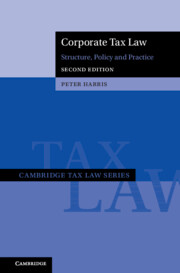Book contents
- Corporate Tax Law
- Cambridge Tax Law Series
- Corporate Tax Law
- Copyright page
- Contents
- Preface
- Abbreviations
- Introduction
- 1 Taxation of Corporate Income When Derived
- 2 Taxation of Corporate Income When Distributed
- 3 Taxation of Corporate Income
- 4 Creating Share Interests
- 5 Transferring Share Interests
- 6 Terminating Share Interests
- 7 Varying Share Interests
- 8 Dividend and Capital Stripping and Value Shifting
- References
2 - Taxation of Corporate Income When Distributed
Published online by Cambridge University Press: 29 February 2024
- Corporate Tax Law
- Cambridge Tax Law Series
- Corporate Tax Law
- Copyright page
- Contents
- Preface
- Abbreviations
- Introduction
- 1 Taxation of Corporate Income When Derived
- 2 Taxation of Corporate Income When Distributed
- 3 Taxation of Corporate Income
- 4 Creating Share Interests
- 5 Transferring Share Interests
- 6 Terminating Share Interests
- 7 Varying Share Interests
- 8 Dividend and Capital Stripping and Value Shifting
- References
Summary
This chapter deals with taxation when a corporation distributes income. It presumes all events occur within a particular country and that the capital structure of the corporation does not change. Dividends as payments with respect to corporate rights are discussed. Corporate financing in the forms of debt and equity are explored with a consideration of hybrid instruments and thin capitalisation. The discussion proceeds to consider the fundamental features of dividends and hidden profit distributions, which have tax consequences at both the corporate and shareholder levels. The dual nature of corporate income is identified, which involves dividends constituting taxable income. With the taxation of corporate income when derived, the result is economic double taxation, the classical system. Arguments in support of and against this double taxation are considered before the discussion turns to consider the options for relieving the double taxation (dividend relief). Dividend relief options at the corporate level and the shareholder level are explored with a consideration and categorisation of recent international practice. Systems behave differently when faced with expenses in deriving dividends, preference income and dividend streaming. Finally, the manner in which a corporate tax system allocates profits as retained or distributed is considered.
Keywords
- Type
- Chapter
- Information
- Corporate Tax LawStructure, Policy and Practice, pp. 193 - 353Publisher: Cambridge University PressPrint publication year: 2024

